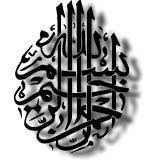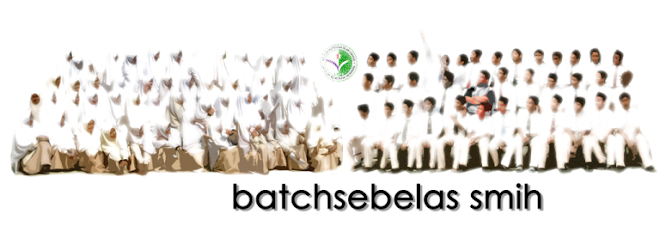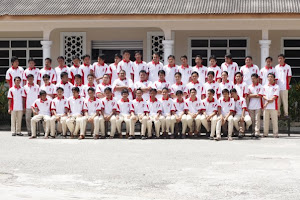Dua belas.
Dimulakan dengan

Saturday 13 August 2011
Wednesday 1 June 2011
ReUNiON BBQ+SteaMBoaT





 ............................................................................................................................................................................
............................................................................................................................................................................Friday 1 April 2011
elmuhimm :D
salam
When I was 17 years old, I had a dream. I dreamt that I was sitting inside a masjid and a little girl walked up to ask me a question.
She asked me: “Why do people have to leave each other?” The question was a personal one, but it seemed clear to me why the question was chosen for me.
I was one to get attached.
Ever since I was a child, this temperament was clear. While other children in preschool could easily recover once their parents left, I could not. My tears, once set in motion, did not stop easily. As I grew up, I learned to become attached to everything around me. From the time I was in first grade, I needed a best friend. As I got older, any fall-out with a friend shattered me. I couldn’t let go of anything. People, places, events, photographs, moments—even outcomes became objects of strong attachment. If things didn’t work out the way I wanted or imagined they should, I was devastated. And disappointment for me wasn’t an ordinary emotion. It was catastrophic. Once let down, I never fully recovered. I could never forget, and the break never mended. Like a glass vase that you place on the edge of a table, once broken, the pieces never quite fit again.
But the problem wasn’t with the vase. Or even that the vases kept breaking. The problem was that I kept putting them on the edge of tables. Through my attachments, I was dependent on my relationships to fulfill my needs. I allowed those relationships to define my happiness or my sadness, my fulfillment or my emptiness, my security, and even my self-worth. And so, like the vase placed where it will inevitably fall, through those dependencies I set myself up for disappointment. I set myself up to be broken. And that’s exactly what I found: one disappointment, one break after another.
But the people who broke me were not to blame any more than gravity can be blamed for breaking the vase. We can’t blame the laws of physics when a twig snaps because we leaned on it for support. The twig was never created to carry us.
Our weight was only meant to be carried by God. We are told in the Quran: “…whoever rejects evil and believes in God hath grasped the most trustworthy hand-hold, that never breaks. And God hears and knows all things.” (Qur’an 2: 256)
There is a crucial lesson in this verse: that there is only one handhold that never breaks. There is only one place where we can lay our dependencies. There is only one relationship that should define our self-worth and only one source from which to seek our ultimate happiness, fulfillment, and security. That place is God.
But this world is all about seeking those things everywhere else. Some of us seek it in our careers, some seek it in wealth, some in status. Some, like me, seek it in our relationships. In her book, Eat, Pray, Love, Elizabeth Gilbert describes her own quest for happiness. She describes moving in and out of relationships, and even traveling the globe in search of this fulfillment. She seeks that fulfillment—unsuccessfully—in her relationships, in meditation, even in food.
And that’s exactly where I spent much of my own life: seeking a way to fill my inner void. So it was no wonder that the little girl in my dream asked me this question. It was a question about loss, about disappointment. It was a question about being let down. A question about seeking something and coming back empty handed. It was about what happens when you try to dig in concrete with your bare hands: not only do you come back with nothing—you break your fingers in the process. And I learned this not by reading it, not by hearing it from a wise sage. I learned it by trying it again, and again, and again.
And so, the little girl’s question was essentially my own question…being asked to myself.
Ultimately, the question was about the nature of the dunya as a place of fleeting moments and temporary attachments. As a place where people are with you today, and leave or die tomorrow. But this reality hurts our very being because it goes against our nature. We, as humans, are made to seek, love, and strive for what is perfect and what is permanent. We are made to seek what’s eternal. We seek this because we were not made for this life. Our first and true home was Paradise: a land that is both perfect and eternal. So the yearning for that type of life is a part of our being. The problem is that we try to find that here. And so we create ageless creams and cosmetic surgery in a desperate attempt to hold on—in an attempt to mold this world into what it is not, and will never be.
And that’s why if we live in dunya with our hearts, it breaks us. That’s why this dunya hurts. It is because the definition ofdunya, as something temporary and imperfect, goes against everything we are made to yearn for. Allah put a yearning in us that can only be fulfilled by what is eternal and perfect. By trying to find fulfillment in what is fleeting, we are running after a hologram…a mirage. We are digging into concrete with our bare hands. Seeking to turn what is by its very nature temporary into something eternal is like trying to extract from fire, water. You just get burned. Only when we stop putting our hopes indunya, only when we stop trying to make the dunya into what it is not—and was never meant to be (jannah)—will this life finally stop breaking our hearts.
We must also realize that nothing happens without a purpose. Nothing. Not even broken hearts. Not even pain. That broken heart and that pain are lessons and signs for us. They are warnings that something is wrong. They are warnings that we need to make a change. Just like the pain of being burned is what warns us to remove our hand from the fire, emotional pain warns us that we need to make an internal change. That we need to detach. Pain is a form of forced detachment. Like the loved one who hurts you again and again and again, the more dunya hurts us, the more we inevitably detach from it. The more we inevitably stop loving it.
And pain is a pointer to our attachments. That which makes us cry, that which causes us most pain is where our false attachments lie. And it is those things which we are attached to as we should only be attached to Allah which become barriers on our path to God. But the pain itself is what makes the false attachment evident. The pain creates a condition in our life that we seek to change, and if there is anything about our condition that we don’t like, there is a divine formula to change it. God says: “Verily never will God change the condition of a people until they change what is within themselves.” (Qur’an, 13:11)
After years of falling into the same pattern of disappointments and heartbreak, I finally began to realize something profound. I had always thought that love of dunya meant being attached to material things. And I was not attached to material things. I was attached to people. I was attached to moments. I was attached to emotions. So I thought that the love of dunya just did not apply to me. What I didn’t realize was that people, moments, emotions are all a part of dunya. What I didn’t realize is that all the pain I had experienced in life was due to one thing, and one thing only: love of dunya.
As soon as I began to have that realization, a veil was lifted from my eyes. I started to see what my problem was. I was expecting this life to be what it is not, and was never meant to be: perfect. And being the idealist that I am, I was struggling with every cell in my body to make it so. It had to be perfect. And I would not stop until it was. I gave my blood, sweat, and tears to this endeavor: making the dunya into jannah. This meant expecting people around me to be perfect. Expecting my relationships to be perfect. Expecting so much from those around me and from this life. Expectations. Expectations. Expectations. And if there is one recipe for unhappiness it is that: expectations. But herein lay my fatal mistake. My mistake was not in having expectations; as humans, we should never lose hope. The problem was in *where* I was placing those expectation and that hope. At the end of the day, my hope and expectations were not being placed in God. My hope and expectations were in people, relationships, means. Ultimately, my hope was in this dunya rather than Allah.
And so I came to realize a very deep Truth. An ayah began to cross my mind. It was an ayah I had heard before, but for the first time I realized that it was actually describing me: “Those who rest not their hope on their meeting with Us, but are pleased and satisfied with the life of the present, and those who heed not Our Signs.” (Qur’an, 10:7)
By thinking that I can have everything here, my hope was not in my meeting with God. My hope was in dunya. But what does it mean to place your hope in dunya? How can this be avoided? It means when you have friends, don’t expect your friends to fill your emptiness. When you get married, don’t expect your spouse to fulfill your every need. When you’re an activist, don’t put your hope in the results. When you’re in trouble don’t depend on yourself. Don’t depend on people. Depend on God.
Seek the help of people—but realize that it is not the people (or even your own self) that can save you. Only Allah can do these things. The people are only tools, a means used by God. But they are not the source of help, aid, or salvation of any kind. Only God is. The people cannot even create the wing of a fly (22:73). And so, even while you interact with people externally, turn your heart towards God. Face Him alone, as Prophet Ibrahim (as) said so beautifully: “For me, I have set my face, firmly and truly, towards Him Who created the heavens and the earth, and never shall I give partners to Allah.” (Qur’an,6:79)
But how did Prophet Ibrahim (as) come to that point? He came to it after being let down by other than Allah: the stars, the moon, and the sun. They were not perfect. They set.
They let him down.
So he was thereby led to face Allah alone. Like prophet Ibrahim (as), we need to put our full hope, trust, and dependency on God. And God alone. And if we do that, we will learn what it means to finally find peace and stability of heart. Only then will the roller coaster that once defined our lives finally come to an end. That is because if our inner state is dependent on something that is by definition inconstant, that inner state will also be inconstant. If our inner state is dependent on something changing and temporary, that inner state will be in a constant state of instability, agitation, and unrest. This means that one moment we’re happy, but as soon as that which our happiness depended upon changes, our happiness also changes. And we become sad. We remain always swinging from one extreme to another and not realizing why.
We experience this emotional roller coaster because we can never find stability and lasting peace until our attachment and dependency is on what is stable and lasting. How can we hope to find constancy if what we hold on to is inconstant and perishing? In the statement of Abu Bakr is a deep illustration of this truth. After the Prophet Muhammad ﷺ died, the people went into shock and could not handle the news. But although no one loved the Prophet ﷺ like Abu Bakr, Abu Bakr understood well the only place where one’s dependency should lie. He said: “If you worshipped Muhammad, know that Muhammad is dead. But if you worshipped Allah, know that Allah never dies.”
To attain that state, don’t let your source of fulfillment be anything other than your relationship with God. Don’t let your definition of success, failure, or self-worth be anything other than your position with Him (Qur’an, 49:13). And if you do this, you become unbreakable, because your handhold is unbreakable. You become unconquerable, because your supporter can never be conquered. And you will never become empty, because your source of fulfillment is unending and never diminishes.
Looking back at the dream I had when I was 17, I wonder if that little girl was me. I wonder this because the answer I gave her was a lesson I would need to spend the next painful years of my life learning. My answer to her question of why people have to leave each other was: “because this life isn’t perfect; for if it was, what would the next be called?”
Sunday 13 February 2011
The Human Stupidity
Tuesday 1 February 2011
Kenyataan IM
Satu kenyataan oleh Ikhwanul Muslimin baru-baru ini menegaskan bahawa gerakan itu berkeyakinan reformasi segera diperlukan jika Mesir ingin mengelak daripada pemberontakan bersejarah di Tunisia yang telah disaksikan oleh seluruh dunia. Insiden yang berlaku di Tunisia sepanjang Disember 2010 dan Januari 2011 merupakan titik penting bagi peristiwa yang dilalui oleh penduduk rantau Arab dan dunia Islam. Rakyat Tunisia telah bangkit melawan penindasan, kezaliman dan rasuah yang dilakukan oleh pemerintah, keluarganya serta pembantu-pembantunya selama suku abad. Seluruh dunia, khususnya Barat dan Zionis terkejut dengan apa yang berlaku dan tiada siapa pun dapat menahan kemarahan rakyat yang meletus di muka kezaliman. Rejim-rejim Arab juga dalam keadaan tidak menentu dan tersentak dengan nasib diktator Tunisia yang terpaksa melarikan diri. Kebangkitan rakyat Tunisia memberikan peringatan jelas kepada semua pihak, di dalam dan luar Tunisia; Isyarat-isyarat ini merupakan titik tolak penting serta dimensi baru dalam kehidupan rakyat negara Arab dan Islam. Kami yakin bahawa alasan dan motif kebangkitan di Tunisia adalah sama dan serupa dengan banyak negara di rantau ini, terutama Mesir. Jika situasinya sama, seperti rasuah, ketidak-adilan, krisis ekonomi dan penindasan rejim yang berpanjangan, maka negara-negara lain juga akan menuju ke arah yang sama, yakni kebangkitan rakyat. Disebabkan kami (IM) sangat cintakan keamanan dan kestabilan, kami percaya bahawa perjuangan berlandaskan perlembagaan akan berhasil sekiranya berlaku reformasi dalam arena politik, ekonomi dan sosial. IM yang merupakan sebahagian daripada negara Mesir berpandangan bahawa pelbagai pihak dan sistem dalam negara ini mampu berubah, jika terdapat kemahuan untuk berubah. Persamaan ini; iaitu kestabilan oleh rakyat dan Ikhwanul Muslimin yang berdepan dengan kepincangan sistem pemerintah, kemampuan - dan tanggungjawab IM - untuk membawa reformasi damai dan perubahan positif; kita mengatakan bahawa persamaan ini sedang melalui satu fasa kritikal dan halus. Tetapi sayangnya sistem ini tidak mengambil langkah-langkah serius untuk memerangi rasuah dari merebak dan membawa pembaharuan yang diperlukan. Situasi ini tidak boleh diteruskan ketika sistem tidak seimbang sedangkan mereka kelihatan tidak berminat untuk menyelesaikan masalah kecuali dengan merujuk kepada anggota keselamatan sambil mengelakkan diri mereka dari berusaha. Jika sistem yang sekarang tidak bergerak cepat untuk mengambil tanggungjawab dan mengambil inisiatif untuk membawa pembaharuan serius, kestabilan tidak akan bertahan lama. Oleh kerana kami sangat menghargai kestabilan negara dan demi mengelakkan kemarahan rakyat, kami menuntut: Ikhwanul Muslimun 19 Januari 2011













